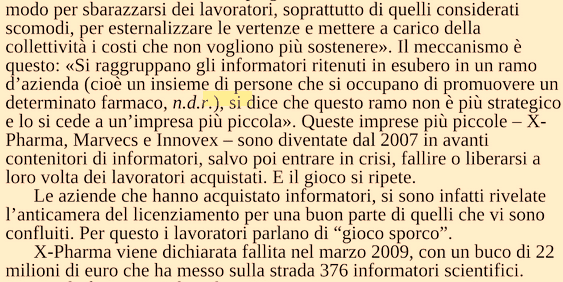
Renunciations or transactions concerning the employee's rights deriving from mandatory provisions, according to the law or national collective agreements, are not valid. However, as clarified by the Court of Cassation in the order n. 20418 filed on 29 July 2019, said invalidity meets a limit in the signing by the employer and employees of a conciliation report in the union, in which, in addition to defining the economic and legal profiles of the matter, future appeals are renounced for reasons substantive as well as procedural.
 A company operating in the pharmaceutical sector, MSD Italia, transferred to another company, X Pharma, its own company branch and in the union he signed with the employees concerned a conciliation report. In said document, the workers expressly renounced any claim connected to the previous employment relationship with the transferor company, against the receipt of sums by way of remuneration equal to 19 months' salary and novation respectively. In these terms, they therefore gave their consent to the company operation, excluding any opposition on the point.
A company operating in the pharmaceutical sector, MSD Italia, transferred to another company, X Pharma, its own company branch and in the union he signed with the employees concerned a conciliation report. In said document, the workers expressly renounced any claim connected to the previous employment relationship with the transferor company, against the receipt of sums by way of remuneration equal to 19 months' salary and novation respectively. In these terms, they therefore gave their consent to the company operation, excluding any opposition on the point.
Subsequently, however, some employees challenged the transfer of the company before the Court as they considered it a mere simulation, therefore they asked for the ineffectiveness to be ascertained, with the consequent restoration of the employment relationship with the original employer, to whom it was proposed a claim for damages. (IPSOA 07/29/2019)
They also considered the transfer void due to the illegality of the cause, reason and object and the lack of requisites, the company branch then subject to the transfer does not represent an economic entity with its own identity, as required by law.
 The Court found that "the signing of the conciliation report in the trade union office, which presents, pursuant to art. 2113 of the civil code, characteristics of substantial incontrovertibility", having, the workers, received, against the waiver of any claim connected to the previous employment relationship, a sum corresponding to 19 months' salary, plus a further net sum by way of novation transaction, and adding that"Under this transaction, therefore, the workers have no legal entitlement to assert against the transferor company defects such as those reported, relating to relations between the transferor and the transferee and the transferee's conduct, since a transaction took place with the transferring company and since the assignee company is not a party to the present proceedings'.
The Court found that "the signing of the conciliation report in the trade union office, which presents, pursuant to art. 2113 of the civil code, characteristics of substantial incontrovertibility", having, the workers, received, against the waiver of any claim connected to the previous employment relationship, a sum corresponding to 19 months' salary, plus a further net sum by way of novation transaction, and adding that"Under this transaction, therefore, the workers have no legal entitlement to assert against the transferor company defects such as those reported, relating to relations between the transferor and the transferee and the transferee's conduct, since a transaction took place with the transferring company and since the assignee company is not a party to the present proceedings'.
Considering that this Court has repeatedly affirmed that the innovative efficacy of the settlement presupposes a situation of objective incompatibility between the pre-existing relationship and that originating from the settlement agreement, by virtue of which the obligations mutually assumed by the parties must be considered objectively different from the pre-existing ones, the appeal must therefore be rejected.
related news: Cassation Ordinance Section L No. 20419 Year 2019
Note: The Conciliation Report is an agreement between employer and employee in a trade union office in the presence of a conciliator. In the report, the worker accepts the company conditions, e.g. an incentive to leave, and declares that he renounces, as in fact he renounces, any further action both in the union and in the present and future judicial proceedings against the company. With the signing of the minutes therefore any further evaluation and request regarding the employment relationship subject of the dispute is precluded.
 Collective bargaining does not always establish the procedural modalities and, often, the conciliations, already written in all their contents (even with elements completely unrelated to the actual dispute) are submitted to the workers concerned, before the union conciliator who limits his part to a purely "notarial" function asking the interested party if he agrees. The report certifies that, if the employee's waiver or settlement takes place in the union, the deed cannot be challenged. In fact, the Legislator "assumes" that the union protects the worker and that the union conciliator defends the interests of the weaker party.
Collective bargaining does not always establish the procedural modalities and, often, the conciliations, already written in all their contents (even with elements completely unrelated to the actual dispute) are submitted to the workers concerned, before the union conciliator who limits his part to a purely "notarial" function asking the interested party if he agrees. The report certifies that, if the employee's waiver or settlement takes place in the union, the deed cannot be challenged. In fact, the Legislator "assumes" that the union protects the worker and that the union conciliator defends the interests of the weaker party.
The Supreme Court of Cassation has established that the union's participation must be effective in the conciliation phase, ie the assistance provided by the union representatives must be real, allowing the worker to know which right he is waiving and to what extent. Stand the workers' representative during the trade union conciliation illustrates the rights to which the worker is giving up and the losses that may derive from them and therefore the worker is fully aware of what he is signing, the conciliation is effective and cannot be challenged and nothing is relevant if there is a disproportion between the mutually made concessions between the parties. The worker can be assisted by his own lawyer.
The union representative "requests the payment of a sum by way of mere donation". The Giver "grants the said higher sum as a mere donation" and, definitively, offers the agreed sum for the above purposes. In essence, the union receives a "certain sum" for each worker who signs the report (ie who is fired).
Facsimile of the settlement and conciliation report at the union headquarters
Related news: Don't forget X-Pharma!
Marvecs, the big scam. The leaders of Pfizer and AstraZeneca-Simesa are condemned





